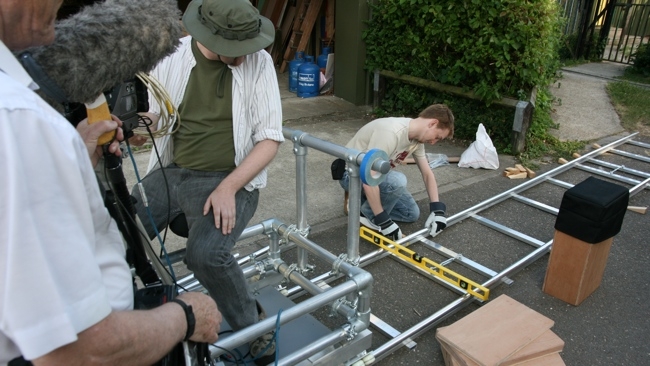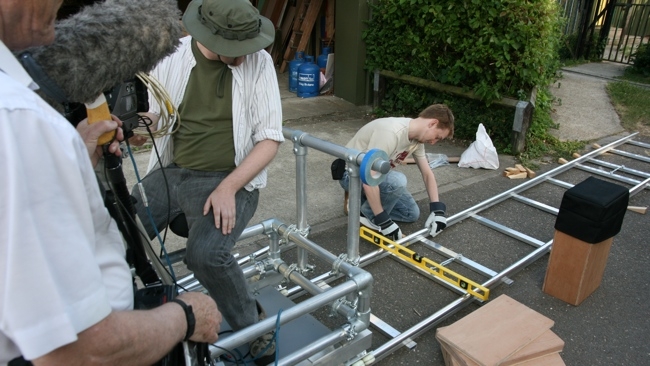
 Crewing
Crewing
Anyone who's ever found themselves holding a camera in one hand, a microphone in the other, and holding the slate between their teeth will understand why films need crew. Throwing more people at the problem is an obvious solution, if you can afford it, but for some reason it's something that smaller productions often seem loath to do, even when there's money
While I must carefully admit nothing specific about any production in particular, I did almost literally find myself in this situation a few days ago, which was about the point at which I realised we'd undercooked the personnel roster a little. Many independent filmmakers, gradually experiencing larger and more complicated shoots, similarly find that many hands make lights work. And if you happen to suffer from gear acquisition syndrome, it's easy to get into a situation where it's actually impossible to simultaneously operate everything you own, especially if you're trying for a proper collaboration of camera equipment, set dressing, lighting, costume, physical effects, and everything else that makes expensive movies look expensive.
Clear as the problem often is, however, there are some subtleties to this which mean that money is not, for once, the sole limiting factor; the purpose of this article is to explore some of the factors affecting how money can be both spent and saved by crewing in the most effective manner.
Management
The subtlety to which I refer, concerned with the effective deployment of people, is generally called management. I hesitate to use the term because it conjures up, for most people, images of grey-suited people behind grey desks, wearing grey nylon ties and poking at an in-tray, but that's what we're talking about here. The popular prejudice against management as a discipline has led, in the opinion of your narrator, to a noticeable problem with the quality of personnel management in the film industry, in part because heads of department frequently achieve the position through artistic achievement without much experience with being in charge of teams. The moment of realisation that one has become a victim, or worse, the perpetrator of poor management on a film set is often the moment at which the value of getting it right becomes obvious.
So, simply throwing warm bodies at the problem isn't enough. This is true at the high end, but it's probably even more true on productions not destined for a thousand-screen release where crews, and the people in charge of them, may be less seasoned. This matters from the point of view of competence, obviously, but it also matters and manageability, where more experienced people will need less direction. And also – while I'm going to get in trouble for saying this – there are certainly crew positions where experience is perhaps more essential than in others. Given an undemanding shot, most people can push a dolly acceptably after a few practice runs, whereas focus pulling is the sort of thing people go and meditate in mountaintop retreats to become good at, and where any error is immediately obvious and just as immediately unacceptable. If you just need someone to move cases around, you can, albeit non-ideally, hire more or less anyone. If you need a steadicam operator, you need a steadicam operator, or you don't bother.
Sometimes this is easy to figure out; sometimes less so. Above the lowest budget levels, the shape of a crew and the chain of command is pretty well determined by convention, but that still leaves a lot of productions below that level where a lot of people are doing a lot of work without the need for a full feature crew. My rules of thumb are that every five people need someone – a manager - to ensure they're all gainfully employed at all times. Make that every three people, if they're inexperienced. The task of running people doesn't have to take anyone out of the loop on doing production work themselves – a director of photography is the manager of the camera department, after all – but get this wrong, and you've got people hanging around, wasting time, waiting for instructions.
Experience
Sourcing crew properly can help: I rent a lot of lighting from stage and events people, because they are generally considerably cheaper than film and TV places. OK, they don't tend to have big HMIs and a lot of flags and light control devices, but they do tend to be about a third less money if you can get by with a few parcans, stands, and some mains distribution. Likewise, crew oriented towards open air concerts, theatre, and events tend to be more available and less expensive than film people, and are just as capable of erecting lighting and managing cables (a discussion of quite why this price offset exists is outside the scope of this article, but probably has something to do with perceived glamour and the idea of film being very profitable).
The other way to look at it is that, as I mentioned above, hiring really good crew can solve the management problem in itself. Hire a good focus puller and the upshot is that you get to use that take with the excellent performance, as opposed to it being soft. But hire a really seriously good one and this will occur as a matter of routine, without your having to be more than peripherally involved. In the hectic environment of an ongoing shoot, with mental bandwidth at a premium, this is sometimes worth paying handsomely for. One reason that big movies cost so much money is that Hollywood is willing to pursue this idea to extremes that don't make sense for most of us, but the value of washing problems away with the money hose should not be overlooked. Solving the management problem can be done the same way. The value of a good first assistant director can be huge, if only by maximising the value of other crew and ensuring the best use is made of time. After all, few directors really want to be concerned with the minute details of scheduling in the few days leading up to the shoot.
Money
The financial argument for proper crewing is straightforward; if the cost of the crew is less than the value of the time saved, it's worthwhile. The only controlling factor is that crew really should be paid, even in a world where many, especially beginners, are happy to work for nothing. Not only is it illegal in many jurisdictions for people to do unpaid work, it's not a sustainable economic model for business to exist solely based on the subsidy of free labour. More than that, it's extremely dubious, morally, for people to do voluntary labour if it's the only way into an industry - there's a question over exactly how voluntary it is. Even the most inexperienced crew on the smallest shows should be paid at the very least minimum wage.
No easy answer
If this article seems a little conceptually schizophrenic, that's because there is no simple answer, beyond the fact that even the smallest shows should possibly be more willing to consider hiring in help than they often are. Notwithstanding a moral stand on ensuring people get properly paid, it has long been a buyer's market, and after all, if the resulting shoot takes three days rather than four, a hypothetical extra crew member is paid for.
In the end, we finished only 45 minutes late last week, and without rolling a dolly over anyone's foot, but it's hard to shake the feeling that extra hands might have helped us make up the shortfall. Deciding exactly who to hire and in what role is a matter for individual productions, but if this at least provokes more people to consider it, that's great.
Tags: Production


Comments